How is specialty coffee evolving outside of “traditional” markets?

For some time now, specialty coffee has been booming in popularity around the globe. The rise in consumption is driven by many factors, including the growing influence of larger multinational chains, a general push for higher-quality products, and a rise in at-home brewing.
North America and Western Europe have long been the largest markets for specialty coffee. At the same time, however, consumers in “non-traditional” markets – like Eastern Europe and South and Southeast Asia – are becoming increasingly interested in specialty coffee.
While many people in these countries still favour commodity-grade and instant coffee products, consumer preferences are shifting. With more and more chains and smaller independent coffee businesses expanding into these markets, specialty coffee is becoming more popular.
To learn more, I spoke to Laurynas Arlauskas, Events Coordinator at the Lithuanian SCA Chapter, Matija Hrkać, CEO and Operations Director at Cogito Coffee in Croatia, and Binny Varghese, a Q processing professional and consultant in India.
You may also like our article on how coffee businesses can expand into new markets.
What’s driving the growth of specialty coffee?
Specialty coffee consumption is increasing around the world for a number of reasons. One of the biggest is the expansion of multinational coffee chains – notably Starbucks – into different markets. As these chains enter or expand into new markets, consumers are introduced to different coffees, brewing methods, and types of beverages.
Similarly, passionate coffee professionals and enthusiasts often move abroad for some time and then return home, and bring their specialty coffee knowledge back with them. This then helps to drive the proliferation of smaller independent coffee shops in previously untapped markets, and increases consumer interest in specialty coffee.
The growth of specialty coffee in these regions is also the result of the habits of younger generations who have increasingly higher amounts of disposable income. For instance, Forbes estimates that Gen Z alone currently has around US $360 billion in disposable income – a large majority of which these consumers enjoy spending on higher-quality food and beverage products like specialty coffee.
Health and sustainability are also increasingly important considerations for many coffee consumers. Plant milks, for example, are often perceived as a healthier and more eco-conscious option instead of cow’s milk. Additionally, specialty coffee brands have started to develop convenient ready-to-drink (RTD) products with added health supplements.
The rise of at-home brewing – largely the result of Covid-19 – has also shaped specialty coffee consumption as well. With many coffee shops closed during the pandemic, coffee drinkers wanted to replicate café-quality drinks at home.
Eastern Europe: A blossoming specialty coffee market
In comparison to Western Europe, the specialty coffee market is much smaller in Eastern Europe. That doesn’t mean, however, that growth isn’t taking place – especially in countries like the Czech Republic, Hungary, Croatia, Poland, Romania, and the Baltics.
In Poland, for instance, the number of specialty coffee shops has increased significantly in recent years. Likewise, in Romania, the number of specialty coffee shops grew from just three in 2013 to more than 90 in 2019. Hungary’s specialty coffee scene has also exploded in recent years, with around 150 cafés open in the country as of 2019.
As specialty coffee becomes more popular in Eastern Europe, Specialty Coffee Association chapters have started to open in countries like Bulgaria, Czech Republic, Hungary, Lithuania, Poland, Slovakia, and Romania.
As well as volunteering for the Lithuanian SCA Chapter, Laurynas has worked in the coffee industry since 2016. He explains that the chapter started ten years ago, and initially aimed to change people’s perceptions about the barista role as a career choice.
“Specialty coffee ambassadors in the Baltics are doing a great job,” he says. “They have influenced both older and younger generations by changing the habits that a ‘typical’ coffee drinker would have.
“Coffee shops in these countries have managed to create spaces that attract not only specialty coffee enthusiasts, but also people in general who enjoy higher-quality products,” he adds.
Industry events are playing a key role in growing the market
Every year, it seems there are more and more coffee events taking place across the globe. And while some markets may be saturated with industry events, the growing number of coffee festivals in Eastern European countries are indicative of the region’s increasing interest in specialty coffee. Some examples include:
Prague Coffee Festival
Warsaw Coffee Festival
Bucharest Coffee Festival
Vilnius Coffee Festival
Zagreb Coffee Break
The Zagreb Coffee Break festival launched in 2018 as a way to connect the local coffee community with international roasters, baristas, and enthusiasts.
Matija is the CEO and Operations Director of Cogito Coffee, a specialty coffee roastery and shop in Zagreb. Established in 2014, Cogito now has seven locations across Croatia, as well as one in Dubai and one in Philadelphia, US.
Matija admits that while the specialty coffee market in Croatia is still relatively small, things are changing rapidly.
“Croatia is a very popular tourist destination, and people that visit are looking for specialty coffee shops,” he explains. “This is a great opportunity for us to showcase coffee quality and new ways of thinking not just to tourists, but also to locals.”
He adds that younger Croatians are helping to encourage this.
“We see that younger people in particular are travelling more, so they are exposed to different cultures and ideas,” he tells me. “This is great for specialty coffee shops because it gives us a chance to build a loyal and educated customer base, and spread knowledge about quality coffee more than ever before.”
The Southeast Asian market
Looking even further east, specialty coffee is making waves in Southeast Asia. Industry analysts anticipate strong market growth in the Association of Southeast Asian Nations (ASEAN), which includes the following countries:
Indonesia
Malaysia
Philippines
Singapore
Thailand
Vietnam
According to Euromonitor International, between 2014 and 2019, sales of specialty coffee in Southeast Asia grew at a compound annual rate of 6% – compared to a global average of 5%.
This growth can be attributed to a number of factors, including the rising popularity of specialty coffee among younger consumers and the increasing availability of premium coffee products.
Thailand, for example, is now home to a large number of young, qualified coffee professionals. Its consumers also spend more than US $1 billion on coffee annually, with US $33 million of this total spent in the “premium coffee” market.
The popularity of cold coffee drinks has also skyrocketed, with high-quality RTD options available on many coffee shop menus.
Considering that Thailand and its neighbouring countries are traditionally tea-consuming, it’s clear that specialty coffee is having a huge impact.
Looking at South Asia: From production to consumption
As for South Asia, while the specialty coffee market is still in its relatively early stages of development, there is plenty of potential for growth. In India, for example, the number of coffee drinkers has increased rapidly over the past two decades.
This is the result of factors such as rising disposable incomes, changing consumption habits and preferences, and increasing exposure to global coffee culture.
Binny is a coffee professional and consultant in India. He is also the creator of C for Coffee, an upcoming documentary about specialty coffee culture in India.
“There is an increasing trend of specialty coffee shops and chains opening across the country,” he says. “Indian coffee producers are also pushing the boundaries with coffees, particularly when it comes to processing.”
Further afield, while specialty coffee markets in other South Asian countries like Pakistan and Sri Lanka are less developed, Nepal has grown significantly in recent years.
“Nepal is definitely making some noise,” Binny explains. “There are more barista training schools in Nepal than in India, while the tourist influx – especially in Kathmandu – has also helped shape its specialty coffee culture.
“Plus, there are many events hosted by the local SCA community throughout the year, which helps to push innovation and growth,” he adds.
Improving coffee production
With countries like India, Nepal, and Sri Lanka also producing coffee, there is ample opportunity to improve quality across the entire supply chain.
As producers receive more support to improve farming practices, we can expect to see even more growth in the coming years. However, there are also significant challenges which farmers must face in these regions, including lack of infrastructure and skilled labour.
“When it comes to countries like Nepal, Pakistan, and Sri Lanka, coffee is not main agenda because it’s not the biggest cash crop,” Binny explains. “Skilled knowledge is limited and climate change creates even more problems, like floods in Pakistan.”
It’s evident that specialty coffee is no longer confined to “traditional” markets. The ASEAN market is already growing rapidly, while the future of the Eastern European and South Asian markets also look equally as promising.
With more and more consumers exposed to specialty coffee around the world, we can expect to see continuous growth – but the rate will largely be dependent on each individual country.
Enjoyed this? Then read our article on Dubai’s blossoming specialty coffee scene.
Image credits: Blue Tokai Coffee, Quick Brown Fox Coffee Roasters
Perfect Daily Grind
Want to read more articles like this? Sign up for our newsletter!
The post How is specialty coffee evolving outside of “traditional” markets? appeared first on Perfect Daily Grind.





Responses